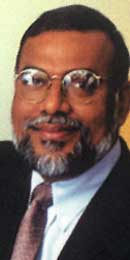|
|
| Survival strategies |
Outcaste: A Memoir By Narendra Jadhav, Penguin, Rs 395
Outcaste is an adaptation from the Marathi bestseller, Amcha Bap ani Amhi, “suitably amended and restructured”. So apart from the poignant tale of an extraordinary couple from an oppressed class, their brilliant and successful son, there is also a stock-taking from the youngest member of the same family — Apoorva. Narendra Jadhav, a decade after Our Father and Us, strives to present a progress chart of the Dalits in India through the experience of the Jadhav family. The graph from the tortured, hungry Damu performing his Yeskar duties at Ozar in Maharashtra to the smooth-talking Apoorva in Maryland, US, whose only sense of being discriminated against comes from not being allowed to stay out late like her friends, may indeed seem stupendous if one were not reminded, by the daily newspaper and by the writer himself, of the atrocities committed on Dalits in India.
No one is more painfully aware of this debilitating social status quo than Jadhav himself. Which is why the ever-conscious Mahar is constantly wracked by references to his low caste — from his teacher, from the upper-caste south Indian to whom he gave a lift and his colleagues. Jadhav, a noted economist, banker, former official at the IMF and now head of economic research of the Reserve Bank of India, asks, “Why can’t they accept me for what I am? …Why did they always have to judge me on the basis of my origins?”
Well, if Jadhav’s milieu is unwilling to forget his “origins”, Jadhav himself is as reluctant. Which is why, despite being a neo-Buddhist and true-blue follower of Ambedkar, Jadhav is hard put to give up on Hinduism — perhaps the most tangible reason for what he calls “the bondage of my caste”. He writes at length of his tearful ritual worship at the Vithoba shrine of Pandharpur. Throughout his own account, however, there is no mention of how his own personal faith, Buddhism, which his father and guru Ambedkar had embraced as their escape from caste oppression, helped him “beat the system”.
This bewildering confusion about one’s identity is perhaps natural in the second-generation Dalit striver. None of it is present either in Jadhav’s ram-rod straight father, Damodar Jadhav, nor his globalized daughter who has no sharp caste identity. Narendra Jadhav’s account, truthful in the expression of his dilemmas and steeped in self-pity, forms the weakest section of the book. Outcaste’s strongest element is the first section, where Damu does the talking.
Damodar or Damu is the real hero of Outcaste, together with his faithful heroine, wife Sonu. Their individual narratives of their struggle — against caste oppression, poverty and misfortune — give a more real picture of the Dalit experience. Damu’s exposure to city life early in his childhood not only helped him defy the overpowering influence of the caste system, but also allowed him to assimilate a wide variety of work experience and, more important, brought him in close touch with Ambedkar and his movement. Damu completely internalized Ambedkar’s one-line dictum — educate, unite, agitate. His uncompromising spirit imbued his wife, struggling to bring up their six children, and also seeped into his offspring, who realized that their emancipation could be possible only through the pursuit of academic excellence. Surviving on meagre meals of bhakris, reading under street lamps, balancing college with full-fledged employment, the children became role models for other Dalit youngsters.
The best supporting actor in this continuous play is, however, Ambedkar, who gave thousands of Damus and Sonus the courage to question society and a dream to chase. Little wonder Narendra Jadhav is trying so hard to teach his daughter the wisdom of the man in a suit and hat. The big question is, will Apoorva manage to remember him?












